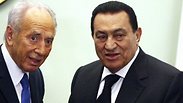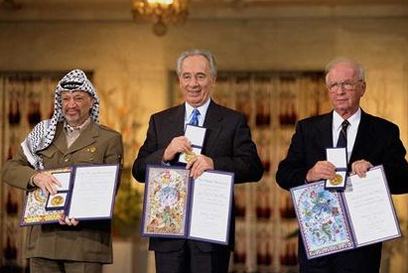
Peres and Mubarak. A heavy political price
צילום: רויטרס
Peres left his fingerprints all over the Arab world
Op-ed: The late president and prime minister pursued peace with all his might. When the door was slammed in his face, he searched for a window. When the window was closed, he tried to squeeze through a narrower opening. But the other side did not miss an opportunity to give him a hard time and shatter his dreams.
It was a boring afternoon in the Jordanian city of Petra. In the shadow of the ancient view of the Red Rock, a group of Nobel Prize laureates wearing ties gathered for an academic discussions about issues in the marginal news. The event’s patrons, King Abdullah and the late Elie Wiesel, tried to calm down the nervous media which were looking for headlines.

And then came the two stars: Shimon Peres, Israel’s foreign minister at the time and a Nobel Peace Prize laureate himself, and his warmongering Egyptian colleague, Amr Moussa. The moment they got on the stage, everything got heated. Moussa raised the issue of the conflict with the Palestinians and wouldn’t stop: Settlements, the right of return, Jerusalem’s division, prisoners, roadblocks and the foot-dragging on the Israeli side. Peres did not give up, and hit back at Moussa at Yasser Arafat’s expense. They lashed out at each other, and the journalists had a ball. When the cameras were turned off, Moussa sat down at the VIP table and Peres insisted on whispering in his ear: “No matter what you say, I won.”

Peres (C) receives the Nobel Peace Prize with Yitzhak Rabin (R) and Yasser Arafat. He was not very fond of the Palestinian leader (Photo: Yaakov Sa'ar, GPO) (צילום: סער יעקב, לע"מ)
I met Peres in Morocco, Cairo, Doha, on the Jordanian side of the Dead Sea, and in the royal palace in Amman.
At midnight we took a stroll - to the security guards’ discontent - along the noisy Corniche in Alexandria. Peres was desperately looking for young people to share their dreams and frustrations with him. He wanted to outline a new Middle East for them, but the opponents of normalization (with Israel) got in his way and prevented him from creating economic cooperation and workplaces. When people explained to him that the trade unions in Egypt were strong and more threatening than the leaders, Peres got angry that his plans were being sabotaged. He was an optimist and not a naïve one. He was stuck in a dream about the new neighborhood that could be formed here – if only his plans would be adopted.
Peres paid a heavy political price for a sentence said by Hosni Mubarak. In an interview to Yedioth Ahronoth, the former Egyptian president said: “When Peres calls and asks to come over, I immediately agree and invite him, because I will forever be in his debt.” According to Mubarak, “If it weren’t for Peres’ personal involvement and his pressure to stop the legal battles over Taba, and his determination to move it to Egyptian sovereignty, I would have cancelled the peace treaty.”
Peres pursued peace with all his might. When the door was slammed in his face, he searched for a window. When the window was closed, he tried to squeeze through a narrower gap. He had 101 solutions to every issue. But the other side did not miss an opportunity to give him a hard time and shatter his dreams.
On Friday, we will see who of the second generation of the neighborhood’s leaders will show up to pay their last respects to him. After all, Peres’ fingerprints can be seen in Morocco, in Egypt, in Jordan, in the Persian Gulf emirates and in Ramallah. Mainly in Ramallah, where Mahmoud Abbas – who shared Peres’ secret in the moves which led to the Oslo Agreements – resides.
Yasser Arafat, it should be noted, was someone Peres was not very fond of. One night, in Cairo, he initiated a Yedioth Ahronoth interview in order to send some tough signals to Arafat. He scheduled the interview for 2 am at his suite.
When I entered, he ordered a cup of coffee for me, “because she looks tired.” I pulled out a pen and a notebook and began asking my questions. Several minutes later, a silence fell upon the room. Peres, who was exhausted from his tight schedule, had fallen asleep. Before the bodyguard had a chance to jump, I slightly kicked his leg. Peres sat up in his armchair and, to my astonishment, continued from the exact point he had left off. The interview was successful, and Ramallah took the hint. We never discussed that event again. I apologize for the kick.










